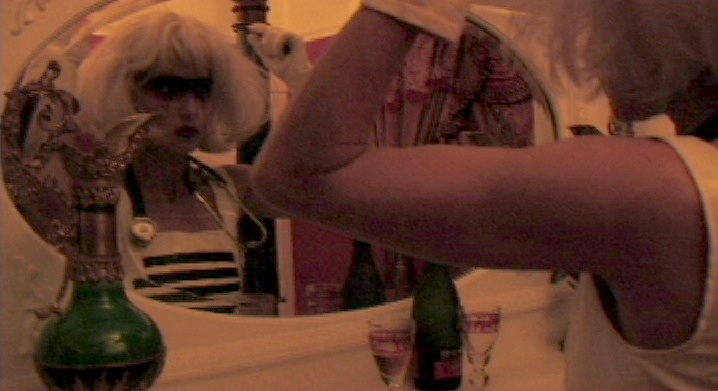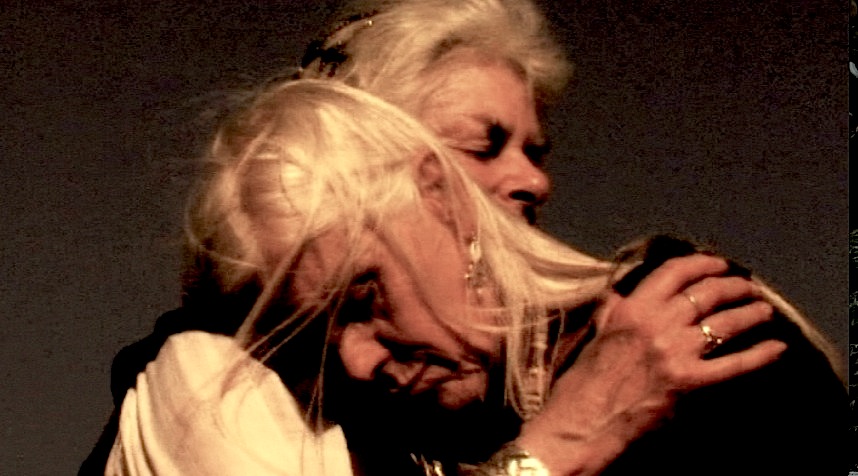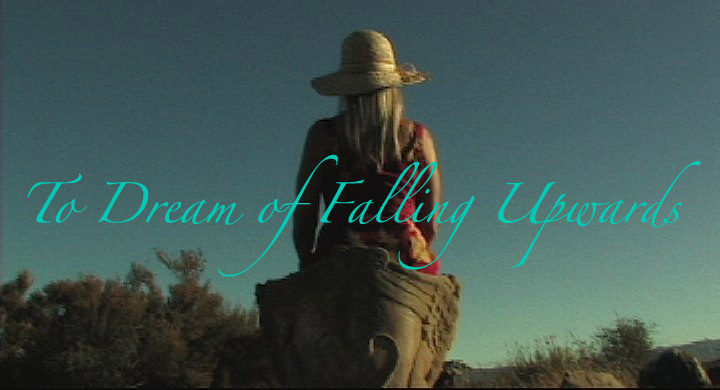Film Review by David Finkelstein
for filmthreat.com (4 stars out of 5)
TO DREAM OF FALLING UPWARDS (2011; 125 min. USA)
“To Dream of Falling Upwards” is a metaphysical thriller comedy by writer/director Antero Alli, whose surreal and poetic shorts I reviewed here. (Not many filmmakers can master the short form, yet also make complex and satisfying narrative features, but Alli seems to know how.) His newest film is set among adherents of an occult Order, somewhat resembling the Magickal cults which practice Thelema, a discipline inspired by the work of Aleister Crowley. The complex, expertly constructed story involves a struggle for succession of the Order, a murder, and a demonic possession. The twists of the story kept me glued to the screen through several viewings, mainly because of the way they gradually reveal new layers of the inner lives of the characters.
A stellar cast, many of them Alli regulars, portray these characters. James Wagner as Jack, the next in line to head the Order, gives a subtle and powerful performance, especially in a standout sequence in which we can easily read a complex sequence of thoughts he has about the murder he is committing simply by reading his face. (The screenplay isn’t very talky, and Alli often prefers to tell his story visually.) Clody Cates Phoenix is enigmatic and fascinating as Maggie, Jack’s lover, who is presumably a much more powerful Magician than he is. Her kinky sex scene in which the murder is committed is particularly lurid and fascinating. Duncan Cook is devilish in a dual role as Jack’s rival and also the demon who possesses him. And Nancy Leatzow is outstanding as the Bruja, a witch who lives in the desert, steeped in a completely different approach to Magick, which resembles the Native American shamanistic tradition allegedly chronicled in the Carlos Castaneda books. Leatzow is absolutely riveting and believable as a highly skilled, talented Magickal practitioner who describes herself as “sometimes a good witch, sometimes a bad witch.”
The underlying concern which drives the narrative is a study of the contrasts between the Magickal approach of the Crowleyites, an urban-centered cult which focusses on amassing personal power, and the rural tradition of the Bruja, which is more focussed on aligning oneself with cosmic forces. The Crowleyites are fond of rules, formal observances, and hierarchy, whereas the Bruja’s tradition emphasizes the control of the mind through meditation, lucid dreaming, and a ritualized use of plant substances. The scenes where she trains her apprentice, a bumbling egghead, comically portrayed by Todd Richmond, resemble the enigmatic jokes of a Zen master. The film presents each of these approaches as having advantages and disadvantages, but clearly prefers the approach of the Bruja, since she is presented as a powerful practitioner, who routinely observes sprits, communicates with animals, and casts effective spells. In a key exchange at the first meeting of the two magicians, Jack, looking at some of the Magickal symbols in the witch’s shack, says “I work these gods too.” “Nobody works these gods,” she replies, “they work us.”

Clody Cates as "Maggie/Angel" ~
Brian Livingston and Jasper Patterson
An important layer of the film is a subplot involving Jack’s two hotheaded apprentice Magicians, Craig and Adam, in two more great performances by Brian Livingston and Jasper Patterson. As part of an Initiation Rite, they are assigned to work as clowns, and the film continually intercuts the action with scenes from their performance of “Jack and the Beanstalk” for an audience of kids. I never thought that I would enjoy watching such a performance, but the sheer charisma and skill of these two actors is so great that it makes the fairy tale compelling. The story of Jack confronting the giant is a kind of mythic mirror which throws light on Jack the magician and his efforts to master his own ego and personal ambition.
Elijah Parizhsky is very good as Vlad, the Russian hit man who wants to realize the American Dream, and who is in love with the Bruja. Like Jack, he too has two apprentice henchmen, comically portrayed by Nick Walker and Russell N. DeGregory. These are possibly the two least clichéd gangsters I’ve ever seen in a film, and their mild-mannered, hippyish efforts to seem menacing to Jack are very funny.
Although the film explores many opposing concepts, particularly rural/shaman Magick vs. urban/Crowley Magick, unlike most Hollywood films about Magick, it does not dwell on good magic vs. bad. None of the characters in the film could be characterized as either good or evil; they are all multi-faceted, which is a large part of what makes the film so fascinating. The main ethics of the film seems to be that it's good for people to gain more knowledge of themselves and of the forces which are moving through us and through the world, and to accept the strange transformations which come with knowledge and growth. Not that the film advocates we should all go out and commit murders for our own spiritual advancement; I would take that part as a metaphor before I reach for my gun.

Nancy Leatzow and Erif Thunen as "the Brujas"
The cinematography, also by Alli, is gorgeous. He uses warm reds and yellows in the rural shots of the Bruja and her meditation rituals walking through a stone labyrinth, surrounded by humming birds. The urban scenes are in cooler tones of blue, black and white. The superlative score, composed and performed by Sylvi Alli, uses wordless songs and hammer dulcimers. This haunting music is a major factor in sustaining the compelling air of spiritual mystery which suffuses the film. On the other hand, a hip hop song and a dream sequence in a music video style provide a contrasting tone, and Alli uses a highly sophisticated color palette and abstract visual style to convey the journey into a spiritual dimension which occurs during a ceremony conducted by the Bruja.
People who are attracted to occult practices which are far outside of mainstream religions are, by definition, non-conformists. The film explores these alternative practices, without getting bogged in esoteric technical information. Viewers who are interested in peering through a window into the invisible worlds of spiritual forces will find in this film an entertaining and funny entrée to Magick. Meanwhile, the film’s underlying poetic layers of meaning possess great depth and power, which will keep you thinking for a very long time.
TO DREAM OF FALLING UPWARDS main page
